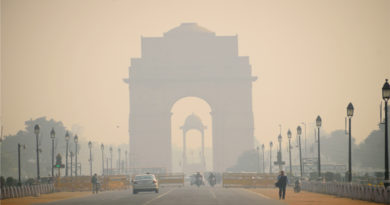The trust deficit and Delhi’s protests against the felling of 16,000 trees

It takes a lot to rouse the country’s capital, Delhi, to get out on the streets and protest. Long suffering one of the foulest air pollution in the world besides sundry other civic issues, it’s taken a ramp up to an unimaginable level for Delhi’s citizens to wake up to the latest disaster unfolding in their midst. This time, the issue is the felling of almost 16,000 trees (14,000, if you go by the official version) by NBCC, the contractor tasked with redevelopment of the city’s large cluster of 7 government housing colonies into a more modern avatar. Like-minded and concerned citizens, under the banner of “Delhi Trees SOS campaign” have already held protests at the site, and efforts are on to collect support through a missed call campaign and more.
At a time when environmental awareness is just about taking root, thanks to visible deterioration in their quality of life, be it air pollution, water shortages, or even the extreme heat in the city, the news of the mass tree slaughter seems to have hit home finally. So there you have it, despite the government’s protestations of all ‘clearances’, compulsory afforestation and the like, noone is buying into the pitch that things will be better. That is partly due to the typical ham handed response as always, and more importantly, the track record of the administration. Consider the local administration. The city government of the Aam Aadmi party has washed its hand of the affair, blaming the centre completely for the mess, with permissions accorded to the project being laid at the door of the Lieutenant Governor, an authority with which the Delhi state Chief Minister and his cabinet seem to be perennially in conflict.
It’s a problem that’s not unique to Delhi, in state after state, afforestation programmes have been a huge disappointment, leaving behind a trail of tall claims, minimal action and environmental degradation. For Delhi, which seems to have spent all of the past decade under a redevelopment plan that has already taken a toll on its trees, be it the metro construction, multiple flyovers or even the relentless work on the sprawling airport ‘ township’, the buck finally seems to have stopped with this latest insult to the common man’s intelligence. According to us at IamRenew, at stake are key questions and a process, that the government must answer and follow if it is to retain any support and future trust of the residents in not just Delhi, but everywhere where the imperatives of ‘development’ need the sacrifice of trees.
First, we need to see a lot more transparency and clarity of response. Ambiguous commitments, compensatory plantations in areas that have nothing to do with the actual area affected, needs to stop. For example, even as the Metro services have made a serious attempt at ‘greening’ some areas around the new stations, their efforts are restricted by an inability to plant really ‘big’ trees, settling instead for trees with shallow roots, as larger trees will no longer take root in the shallow soil layer on top .
After an NGT order in 2017 that called for planting saplings in advance, an order that makes eminent sense considering the time it takes for saplings to take root, it turns out that not a single sapling has been panted in the compensatory plantings needed for the current project.
It was common sense that with the city suffering from massive pollution, a ‘heat island’ effect and more, all of which could be managed better with more trees, any such plan would be resisted. However, no proactive measures, be it enforcing a policy on managing the capital’s construction and construction waste, or planting trees within the city in a concerted move rather than some invisible village on the Yamuna floodplains or the like, has been made. That’s simply criminal negligence.
While we really don’t see the government backing away from this foolish venture, considering the way our state operates and how blindsided it can get when it comes to the interests of its ‘own’, we believe it will be an important victory for the citizens to extract promises, and action on the ground now to correct some of the past failures. While it seems a given that things will get worse before they start to get better, considering the speed and efficiency of the governments bureaucracy, it can be hoped that 5-7 years from today we will see something positive come out of this, as other measures, also long overdue, be it a city bus system that works, or hopefully more electric vehicles take over.
Whether it means decentralisation of powers to the city’s thousands of RWA’s for tree plantation and maintenance, transplanting trees from the affected areas to other suitable areas, and to stop considering grassy areas or plots as ‘green cover’, every small point will matter.
A common observation used to explain the apathy of city citizens is the somewhat true fact that a lot of its residents are temporary, out to make a better living before moving back to their original homes. Or as Shailesh Singh, managing Partner, Massive fund, a fund that has been set up with the express purpose of solving large environmental problems puts it, ” A lukewarm response from Delhi will show that frankly people don’t really care about issues like air pollution. That encourages governments to defer or even avoid taking strong action to fix the problem, eventually becoming part of the problem itself. Delhiites seem to behave like chickens in a slaughterhouse, more intent on getting their next meal oblivious to their fate and the slaughter happening in from of them”. Unfortunately, that is completely true of the residents who are slated to move into the houses once made in the new, planned colonies. The government employees. Perhaps it is for these putative residents too, to push for change from within now, rather than suffer the consequences when they shift. They owe it to the city that will provide them with a living.
copyright:iamrenew.com




